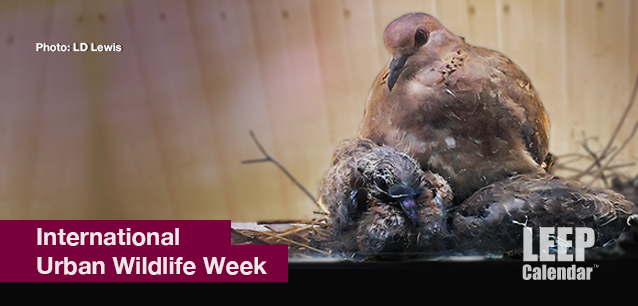 AD
AD
Today is: December 22
Scroll to explore events active on this date.
Additional Events on LEEP
LEEP INK FEATURES

August? Absolutely!
In August, we live through the Dog Days of Summer. It's hot and often humid, and those who can leave for better climates do. Down south, winter is in full force. August is also known as "the ...

In The Heat of July: July 2025 Events
Is it hot enough (or cold enough if you're below the equator) for you yet? There is actually a day for that! Like every month, I pick a diverse collection of events you may or may not know about. This ...

May Blooms: Events in May 2025
Along with October, May is one of the most densely packed months of the year. It's before the summer humidity and the last whole month of the school year. The weather is warming in t...
About International Urban Wildlife Week
Real Estate , Education
Technology & Telecom , Science & Math
Ends: Oct 19, 2024
DESCRIPTION:
CELEBRATING THE WILDS OF THE CITY
INTERNATIONAL URBAN WILDLIFE WEEK
International Urban Wildlife Week occurs during Urban October and began in Los Angeles in 2015. Its original focus was on P-22, the beloved wild cougar that roamed the hills and cities of the greater Los Angeles area. Unfortunately, P-22 had to be euthanized in early 2023, plunging the entire metropolis into mourning, with over 6,000 Angelinos attending his memorial service.
Despite it being one of the largest cities in the world, Los Angeles has a robust wildlife population, including coyotes, deer, golden eagles, rabbits, cougars, bobcats, raccoons, and even its flock of green parrots who have thrived in the city since they escaped a pet store fire in the early 1980s. In fact, all cities have wildlife, even yours (and not just rats). P-22's legacy continues with the now International Urban Wildlife Week by the National Wildlife Federation, which is supported by nature conservancies worldwide. It focuses on the necessity of wildlife zones, animal crossings over highways, green spaces, and clean-up rivers to encourage cohabitation.
For example, in 2019, Utrecht, Netherlands, started a trend in Europe by planting flowering plants atop its city bus stops to provide bees and pollinators with an environment. Other cities in Europe quickly followed suit. Additional examples include:
—China's sponge cities double as flood mitigation.
—Milan, Italy's plant-covered skyscrapers.
—MENA nations, including Tunisia and Saudi Arabia, use grey water (recycled water) for everything from gardens to toilets.
Urban wildlife projects create a more livable environment for people, plants, and animals. They preserve habitat, clean toxins from the air, reuse valuable resources, and provide defense against flooding, fires, and landslides. International Urban Wildlife Week is your opportunity to consider the nonhuman living entities around you and how best to ensure you both thrive.
Header image: Desert dove cares for her newly hatched chicks in a windowsill nest on the Saudi Aramco campus in Dhahran, Eastern Province, Saudi Arabia. Photo LD Lewis
VIDEOS
SUPPORTING DOCUMENTS
Currently, this event does not have supporting documents.
ADDITIONAL IMAGES
Currently, this event does not have supporting images.
Where would you like to go now?
 AD
AD


/footer-logo.svg)
